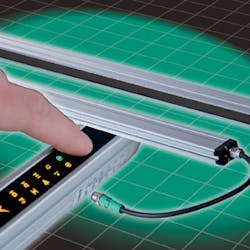Light grids from Pepperl+Fuchs support a range of automated detection applications
LGS Series light grids feature an IP67 enclosure housing with the control unit integrated into the receiver module, plug-and-play mounting, and software-free and PC-free programming, making them suitable for integration in warehousing, material handling, packaging, and general automation applications. Advanced functions such as object identification and height monitoring capability enable users to simplify typical automation tasks. The light grids remotely communicate data over IO-Link interface and are able to serve applications ranging from monitoring an area for falling objects to detection of parts down to 4 mm in size and more complex tasks such as object or hole profiling.
Pepperl+Fuchs
Twinsburg, OH, USA
-- Posted by Vision Systems Design
View More Vision+Automation Products
Locate a vendor or system integrator in our Online Buyer's Guide
---
NEW PRODUCT PRESS RELEASE
Reliably Detect and Identify Different Objects Cost-Effectively with Highly Flexible LGS Series Light Grids from Pepperl+Fuchs
Innovative design provides productivity enhancing functions previously relegated to more expensive devices including quick object detection, object identification and height monitoring
TWINSBURG, OH – Pepperl+Fuchs introduces LGS Series light grids. The LGS series features a slim IP67 enclosure housing with the control unit integrated into the receiver module, uncomplicated plug-and-play mounting plus software-free and PC-free programming. As a result the LGS series is an easy-to-install, commission and operate sensing solution ideally suited for warehousing, material handling, packaging and general automation applications. Advanced functions such as object identification and height monitoring capability – features typically found only on significantly more expensive sensing devices – enable users to significantly simplify many typical automation tasks.
“LGS series light grids come with a range of noteworthy functions previously found only on much more expensive devices, including lightning speed object detection even with beam crossover enabled, the option of not just detecting objects but identifying them too, and even remotely communicating data via an IO-Link interface,” says Michael Turner, Product Manager, Pepperl+Fuchs. “Even if one or two beams are permanently obstructed due to circumstances in the application, they can be ignored with the beam blanking function. At startup the signal strength is automatically adjusted and optimized for the environmental conditions making switching more reliable and enabling faster response times.”
The feature-rich and cost effective design of the LGS series makes it an ideal solution for applications ranging from the simple to the complex. Examples of relatively simple applications include monitoring an area for falling objects, ejection control and the detection of parts as small as 4mm. Examples of more advanced applications include overhang detection or web sag and height monitoring. Using the integrated height monitoring function, up to 3 levels of control can be set with the touch field. More complex application examples include object or hole profiling, where objects can not only be detected but identified using the integrated object identification function. In any of these applications, programming and detection is accomplished quickly and easily without requiring a PC and without using software.
“LGS light grids can be programmed using a capacitive touch field located on the receiver, and no PC software is required. In fact the LGS Series is the first sensor in its class to enable programming and configuration utilizing a modern capacitive touch screen. Even if the user’s hands are dirty or lightly gloved, it takes just one finger or a thumb to configure the various built in functions.” says Turner. “And unlike the consumer electronics type, the LGS touch field is designed to withstand the normal and often unfavorable conditions found in the industrial world.”
The range of operating modes and features can help improve productivity by enabling new detection solutions. Three separate height switching outputs control object height or tension checks and enable the LGS to detect or report three height profiles. Using flexible teach-in options these light grids can identify objects via their geometry, including objects with gaps and openings, when they are moving or in a fixed position.
Commissioning and operation are similar to standard photoelectric sensors – users simply position the transmitter and receiver opposite each other and signal calibration occurs automatically. Desired features are set without any software, and an innovative touch field with illuminated pictograms facilitates quick and easy step-by-step programming without a PC. Standby mode minimizes energy consumption and maximizes service life in applications where the light grids are not in continuous operation.
LGS light grids are available in customizable lengths from 100 mm to 3,200 mm, a broad range of resolutions from 8 mm up to 100 mm and provide reliable operation in temperatures as low as -30 degrees C. Response time varies from 2 ms to 20 ms depending on the number of beams (4 beams to 253 beams) in the light grid.
Pepperl+Fuchs is a world leader in the design, manufacture and application of high quality factory and process automation products and services. Pepperl+Fuchs pioneered the development of proximity sensors 50 years ago, and has set the standard for innovation and quality ever since.
Contact:
Tel.: 330.486.0001, Fax: 330.405.4710, [email protected]
SOURCE: Pepperl+Fuchs
